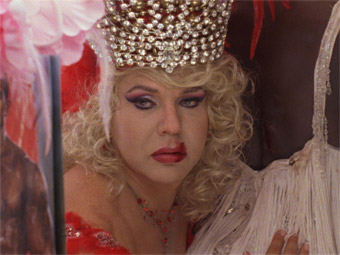|
My first foray into the 24th BFI London Lesbian & Gay Film Festival came at the hands of Portugese director João Pedro Rodrigues and his drag-queen love story To Die Like a Man (Morrer Como Um Homem). In many ways this film feels like a perfect fit for the festival, with plenty of tropes one might lazily associate with gay cinema. But in reality, holding up Rodrigues' picture as any kind of paradigm would do the whole festival a disservice. There are a huge range of films on show at this year's event, with everything from camp drama to factual documentary. In fact, To Die Like a Man purposefully discards some of the standards you would expect to find in any film, resulting in an intriguing cocktail of ideas and styles that is sometimes pleasing but often confused.
We spend almost all of the 133 minute run-time in the company of Tonia (Fernando Santos), a well-loved 1980s drag artist who wears her female persona both on and off the stage. Rodrigues never shows us any of Tonia's performances, preferring to focus on the copious amounts of backstage bitching. All of which help form a character who is the quintessential drama queen, but still feels like a real person. The credit for maintaining this balance must got to Fernando Santos, a real life drag-queen, who effectively eschews subtlety to bring to life an obviously dysfunctional persona with a melancholy heart. To Die Like a Man can be a bumpy ride, but Santos does his best to steady the ship at every turn. The brief periods in which the camera loses focus on its lead are almost always the weakest parts of the film.

Tonia may be the star, but her story revolves around Rosário (Alexander David), a gay man half her age with whom she has fallen head over heels in love. At times its hard to fathom how such a deep affection has developed – Rosário is a drug addict, a thief, and a generally abusive partner – but as the film progresses, the sheer volume of interaction between the pair begins to wear you down. Eventually you're forced to believe that there must be a real depth of feeling tying them together. Screen newcomer Alexander David does a convincing job of portraying Rosário as an impressionable product of his damaged environment, rather than a truly corrupted personality. Almost all of the cast are inexperienced in film, but together form what is unquestionably the work's strongest pillar. Chandra Malatitch in particular, as Tonia's estranged son Zé Maria, puts in an quality shift as part of a subplot that is predictable but effective thanks to excellent pacing and placement.
Were To Die Like a Man a character driven study of a socially disapproved relationship, then Rodrigues would have the makings of an excellent film. Sadly, the picture suffers from a lethal case of over-direction. João's fondness for the oblique and abstract forces the action to stumble into a variety of ill-conceived musical interludes and outlandish characters. Most of the film is set in the real world, dealing with real people and real problems, but this is deeply undermined by the strange shifts in style that pock the entire picture. Before we have even been thoroughly introduced to our main character, one highly unintelligible scene has played out. Almost completely hidden by the dark, a military patrol stalk the woods, looking for something that is never indicated or obvious. The unit separate into pairs and continue their watch, while two of them fornicate behind a tree. What may or may not be the same duo (in the near pitch-black it is very difficult to tell) then come upon a house, in which two drag-queens are playing piano and singing songs. After some brief discussion and an allusion to a character we are yet to learn anything about, one man shoots and kills his comrade. These are not the actions of real people and they jar horribly with the near gritty realism with which Tonia's story is told. This is just one example of the pockets of weird behaviour which reoccur throughout the film, radically demeaning the quality provided by Tonia & Rosário's tale.
Strange abstract moments are not the only example of a director fiddling too much with the film's core qualities. Rodrigues' camera is continually unwilling to focus on the faces of the speaking character. A quick, or even lengthy, shot of the listener's reaction is a great – perhaps even necessary – tool to convey the relationship between two people. But when we are not allowed so much as a glimpse at the active character, the result is less than satisfactory. This is most obviously annoying in the very first scene, when Tonia and her fellow drag-buddy discuss a radical sex change operation. For the initial part of their discussion the duo are partially hidden behind a row of climbing plants. We can see their rough forms, but not who is speaking at which moment. This is the first time either of these characters have appeared, so we have no way of knowing which voice to connect with which person and not even to which body we can attribute the sound.
After another ill-judged abstract interlude, the film's final act comes close to being truly moving, but by this point the lengthy run-time has already begun to wear thin. If Rodrigues had stripped away all of his ponderous a cappella musical interludes and strange interloping characters, we would be left with raw emotional cinema. It would have created a far more conventional film, but with such an unconventional story to tell, there's no need for the layer upon layer of directorial contrivance. The majority of the picture's positives lean on the excellent work of Fernando Santos, but a confused collection of disparate interludes spoil To Die Like a Man's vein of quality, sending you home more frustrated than entertained.
|